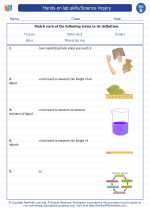Hands-on Lab Skills/Science Inquiry
Hands-on lab skills and science inquiry are essential for students to develop a deep understanding of scientific concepts and processes. These skills involve the ability to conduct experiments, make observations, collect and analyze data, and draw evidence-based conclusions. Here are some key concepts and skills related to hands-on lab skills and science inquiry:
1. The Scientific Method
The scientific method is a systematic way of investigating natural phenomena and acquiring new knowledge. It involves the following steps:
- Ask a Question: Identify a question or problem that you want to investigate.
- Formulate a Hypothesis: Make an educated guess about the answer to the question or problem.
- Conduct an Experiment: Design and carry out a controlled experiment to test the hypothesis.
- Collect and Analyze Data: Record observations and gather data to support or refute the hypothesis.
- Draw Conclusions: Use the data to draw conclusions and determine whether the hypothesis is supported.
- Communicate Results: Share the findings with others through written reports, presentations, or other means.
2. Lab Safety
Before conducting any science experiment, it's important to understand and follow safety rules and procedures in the laboratory. This includes wearing appropriate protective gear, handling chemicals and equipment properly, and being aware of potential hazards.
3. Experimental Design
Good experimental design involves planning and carrying out experiments in a way that ensures valid and reliable results. This includes identifying independent and dependent variables, controlling for extraneous variables, and replicating experiments to verify results.
4. Data Collection and Analysis
When conducting experiments, it's important to collect accurate and relevant data. This may involve making measurements, recording observations, and organizing data in tables or graphs. Data analysis includes interpreting the results and identifying patterns or trends.
5. Critical Thinking and Problem Solving
Hands-on lab skills and science inquiry develop critical thinking and problem-solving abilities. Students learn to think analytically, evaluate evidence, and make informed decisions based on their findings.
6. Inquiry-Based Learning
Inquiry-based learning is a teaching approach that emphasizes the role of questioning, investigation, and discovery in the learning process. It encourages students to explore scientific concepts through hands-on activities and experimentation.
By developing hands-on lab skills and engaging in science inquiry, students gain a deeper appreciation for the scientific method and the process of discovery in science.
.◂Science Worksheets and Study Guides Second Grade. Hands-on lab skills/Science Inquiry
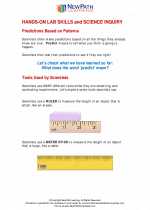
 Worksheet/Answer key
Worksheet/Answer key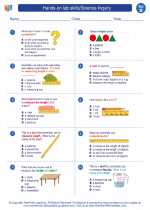
 Worksheet/Answer key
Worksheet/Answer key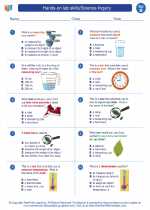
 Worksheet/Answer key
Worksheet/Answer key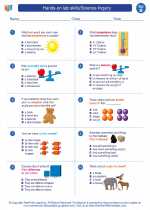
 Vocabulary/Answer key
Vocabulary/Answer key